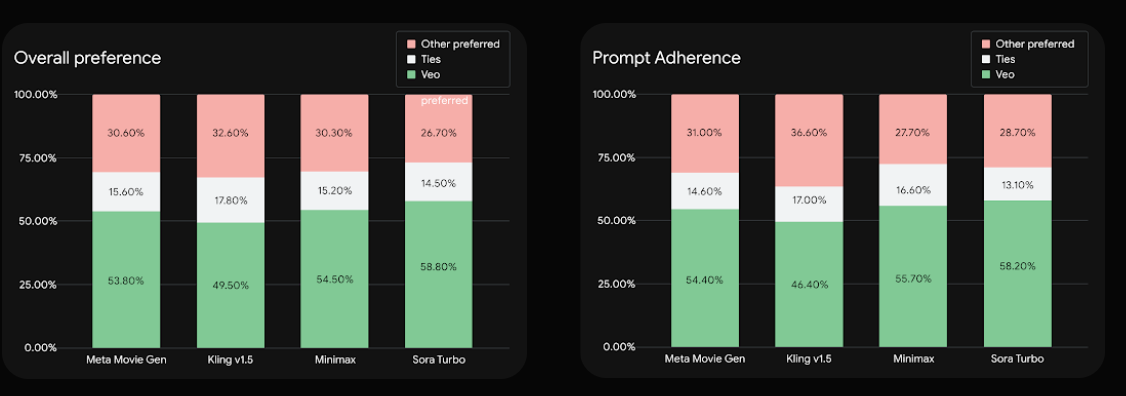Google's Veo 2 outperforms OpenAI's Sora Turbo in head-to-head AI video generation tests

Google unveiled two new AI models today: Veo 2 for video generation and Imagen 3 for images. According to human evaluators, both models set new benchmarks in their respective fields.
The new Veo 2 model can generate 4K videos and responds to specific filmmaking instructions, including different types of lenses and camera effects. Unlike previous models limited to short clips, Veo 2 videos can be "extended to minutes in length."
One improvement in Veo 2, Google says, is how it handles common AI generation problems. The model produces fewer "hallucinations" - weird artifacts like extra fingers or random objects that often pop up in AI-generated content. Google also says the model has gotten better at representing realistic physics.
The company conducted direct comparison tests using 1,003 prompts from Meta's MovieGenBench dataset, with human raters evaluating 720p resolution, eight-second video clips. In these head-to-head comparisons, Veo 2 came out ahead of its competitors, including OpenAI's Sora Turbo, both in overall video quality and in how well it followed the given instructions.

Despite these improvements, Google is upfront about Veo 2's limitations. The company admits that creating consistently realistic and dynamic videos remains a significant challenge. In particular, the model still struggles with complex scenes and motion sequences - suggesting there's still plenty of room for improvement in future versions.
For now, Google is taking a cautious approach with Veo 2's rollout. Veo 2 will be limited to select products including VideoFX, YouTube, and the Vertex AI platform. The system will expand to YouTube Shorts and other products in 2025. All videos generated by the system will include an invisible SynthID watermark identifying them as AI-generated.
Imagen 3 update from Google brings more vibrant AI images with better color balance and detail
Along with Veo 2, Google announced a major update to its image generation AI. The new Imagen 3 model produces more vibrant images with better color balance, thanks to several under-the-hood improvements.
Google says Imagen 3 can now handle a broader range of artistic styles. Whether you're looking for photorealistic images, impressionist paintings, abstract art, or anime-style illustrations, the model can adapt accordingly. The company also highlights Imagen 3's ability to create more detailed images with improved textures and finer elements.
Google is making Imagen 3 widely available through its ImageFX tool, launching in more than 100 countries. While users can already access Imagen through Google's Gemini Chat, the company hasn't announced when this platform will get the upgraded Imagen 3 model.
AI News Without the Hype – Curated by Humans
As a THE DECODER subscriber, you get ad-free reading, our weekly AI newsletter, the exclusive "AI Radar" Frontier Report 6× per year, access to comments, and our complete archive.
Subscribe nowAI news without the hype
Curated by humans.
- Over 20 percent launch discount.
- Read without distractions – no Google ads.
- Access to comments and community discussions.
- Weekly AI newsletter.
- 6 times a year: “AI Radar” – deep dives on key AI topics.
- Up to 25 % off on KI Pro online events.
- Access to our full ten-year archive.
- Get the latest AI news from The Decoder.